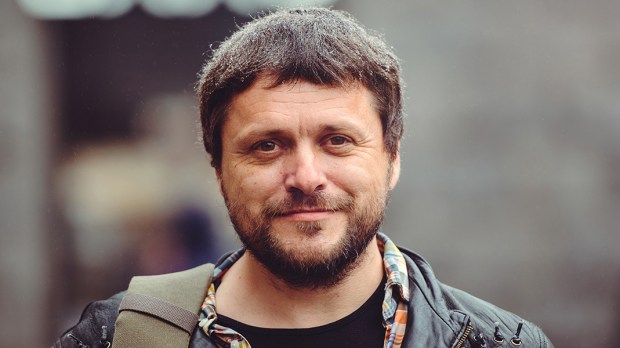Let’s be honest — this ongoing COVID-19 pandemic has been weird, and for the vast majority of us, it’s been tough. I’ve had my fair share of low points, but I’ve also noticed tremendous fruit in my life in the midst of the difficulty. It’s been a crazy roller coaster ride. In fact, some of the most fruitful moments in recent memory, in terms of insightfulness and personal growth, have come in these last eight months. And I can’t imagine them happening without the help of these uniquely difficult circumstances.
When I think about how this particular negative experience has had such a dramatic, positive effect on my life, I can’t help but think that there is something about a crisis that can help a single man like me better realize his God-given potential. But because I’m generally against pandemic-sized crises, It’s got me thinking about how to replicate its effects without the collateral damage.
First, some background … I’ve worked for a Catholic parish for the last six years doing communications and marketing. I love my faith, and most days, there’s nothing I’d rather do than work to bring the Church’s message to her people in new and creative ways. That said, I’ve learned that there can be something particularly challenging about working as a lay person for the Church — despite our best intentions, what can start out as an awesome opportunity to serve God and his people can eventually become, well, just another job.
Let’s just say, as of about March 1, 2020, I was, well, comfortable. I wasn’t getting by with the bare minimum by any means, but I wasn’t exactly exhausting myself at work each day and week. That quickly changed as of March 19. That’s when I learned that within 24 hours we had to close our Masses to the public due to the increasingly widespread COVID-19 outbreak. And then it occurred to me — I had better figure out to live-stream our Masses! Because the alternative meant that our parishioners would be completely disconnected from the parish, and maybe even God as a result … for who knows how long.
Suddenly my job — which I never doubted was important — became urgent. And that changed everything.
Up until that point, I rarely worked more than 40 hours a week, and never more than 45-50. For the next two months solid, I averaged more than 60 hours a week, as our entire parish life had to be converted to and executed in a distance format — and the lion’s share of that work fell to me. All the while not knowing if our payroll would hold up amidst declining revenue. (And that’s to say nothing of doing this all with great uncertainty surrounding the potential human devastation of this novel coronavirus itself.)
It was a crazy, stressful time. But there was something incredibly satisfying about getting up in the morning, putting all I had into my work, and then finishing the day completely exhausted — but also knowing I did something absolutely essential that day. It fueled me. I found myself more focused, more productive, and more invested in the work I was doing. And I found those virtues spilling over into the rest of my life, from exercise to personal prayer.
Then something funny happened. I took some time off in June and vacationed in a faraway place, to see some family, get some rest and relaxation, and clear my mind. When I returned to work, things settled down into a nice system set up with the live-streaming and I didn’t need to work overtime any more. In fact, I had some extra vacation time due to some canceled trips I had planned for April and May, so I was able to take Fridays off for a couple of months. And I got lazy again, simply put.
Work became work again. I started living for the weekends and developed some bad habits along the way. I found myself becoming comfortable again, less productive, less driven to improve myself, and more focused on self-gratification — all the while reassuring myself by thinking “I deserve this” after my hard work in the spring. I was still a good (enough) Catholic, but the self-discipline I had strengthened and the magnanimity I had nurtured from March through May had effectively faded.
Without the urgency of the crisis I faced at the onset of the COVID pandemic, I had lost my edge, and with it a sense of mission and commitment to virtue. But I was determined to get it back. The big question was how to do it without the benefit of a newfound crisis lighting a fire under my butt?
Self-denial
Fr. Bill Baer, the great hero and mentor of my life, God rest him, would always rail against the bachelor mentality and how it is diametrically opposed to the Christian life. The bachelor, he would say, seeks to gratify himself above all while making the most of the time after he has been freed from his parents’ watchful eye and before he’s *tied down* to a wife — and especially if he has cash to spare. So I know full well that whenever I’m feeling too comfortable as a bachelor, I need to make some changes.
Whenever I’m feeling particularly self-indulgent, I’m inclined to think, “I could use a Lent right now.” It’s not insignificant then that the fruitfulness of my spring had coincided with Lent. In fact, I remember thinking as it was happening, that while Matthew Kelly was promoting his Best Lent Ever series, we were all having the Worst Lent Ever. It was hard as hell. But I’m also convinced that’s part of what made it so good.
Lent serves as something of a spiritual assassin targeting all of our most self-indulgent tendencies. For me, I often live for good food and drink. I’m not a high end foodie by any means, but I take my burgers and fries very seriously, thank you very much. And I’m definitely a beer and cocktail snob. Lent is all about giving up the comforts of food and drink so that you can fill that void with higher things. It’s self-denial — not for its own sake, but so that you can free yourself up to do good. When I’m intentionally not obsessively seeking out the hottest new restaurant or bar in town, it stings a little bit. And that’s an opportunity to turn that energy towards things that last.
The Church, in her wisdom, gives us penitential seasons like Lent (and, to a lesser degree, Advent) as opportunities to make a big move of re-orientation back to God. But we can utilize that same wisdom and those same virtues any time — on a daily basis and also on Fridays, which remain a particularly penitential day all year long.
Purposeful, practical, intentional living
The Christian life is more than just self-denial, however. I needed to figure out not only how to stop indulging myself, but also how to better use my time and talents for good. And for this I turned to something called the Monk Manual, which re-imagines the daily, organized examen of monks for, well, the rest of us.
For three months now, I’ve leaned into the Monk Manual and its simple guidance on more intentional living. Through daily planning, self-reflection, and intentional prioritization, the pages help you to decide what’s most important in your life, commit to it in writing, then go back the next day and evaluate how you did.
The Monk Manual has been incredibly fruitful for me in helping me live more intentionally, and it starts with prioritizing what I want to accomplish each day. But what’s perhaps encouraged the greatest internal growth is through the sections titled “Ways I Can Give.”
Each day I commit to thinking about how I can give. It seems like a simple thing, and yeah, it probably is. But let me tell you that’s one of the harder things to fill out each day — which tells me I have a ways to go in this category. Giving is not that hard! Except, of course, when you’re only living for yourself. The Monk Manual has helped me to go out of my way to make sure I’m living for others — even in small ways like “call cousin Mark” — and it’s made a big difference.
I’m convinced that perhaps the biggest challenge of being a Christian single man is the daily battle to not get too comfortable with bachelorhood. This realization drives home for me the beauty of the different vocations in the Church which give us the opportunity to love and serve.
A crisis can help an unmarried man be less of a bachelor — at least in lieu of his ultimate vocation. But, thankfully, God in his mercy and the Church in her wisdom provide other, less-dramatic ways to teach single men to live for others. What are you waiting for?

Read more:
These 3 sports are ideal for men to do together

